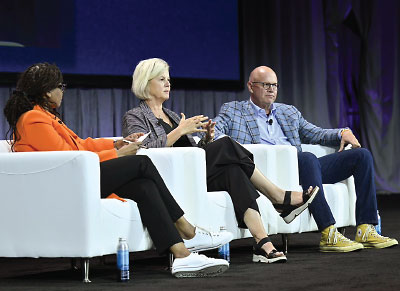Dopesick Author Beth Macy Featured in Convocation Discussion on Opioid Addiction
Abstract
Macy said she hopes her books and the Hulu series are helping to break the silence and stigma around substance use disorders. “One woman I know said, ‘I watched the show and, for the first time in three years, I called my addicted son.’ ”
“I wanted to tell a really important story about medication-assisted treatment [MAT] and about how lifesaving it is,” said journalist Beth Macy, author of Raising Lazarus: Hope, Justice, and the Future of America’s Overdose Crisis, during the William C. Menninger Memorial Lecture at APA’s Annual Meeting.
“It’s also about how stigmatized people with substance use disorders [SUDs] are, including by people with SUD themselves, who may often perceive themselves as unclean.”
Macy is also executive producer and co-writer of the Peabody Award–winning Hulu series “Dopesick,” which is based on Macy’s 2018 bestseller, Dopesick: Dealers, Doctors, and the Drug Company That Addicted America.

Patrice Harris, M.D., M.A. (left), and Stephen Loyd, M.D., engage in conversation with best-selling author Beth Macy at APA’s Convocation of Distinguished Fellows.
This year’s Menninger lecture was in the form of a conversation with Macy and Stephen Loyd, M.D., chief medical officer of Cedar Recovery, an addiction treatment company headquartered in Mount Juliet, Tenn., and an internist who is in recovery from an opioid addiction. He is a former medical director and assistant commissioner for substance abuse services with the Tennessee Department of Mental Health and Substance Abuse Services. The character of Samuel Finnix, M.D., in the Hulu series played by Michael Keaton is based in part on Loyd and his story.
The conversation was moderated by psychiatrist Patrice Harris, M.D., M.A., past president of the AMA and chair of the AMA’s Task Force to Reduce Opioid Abuse.
Loyd has been in recovery since 2004. Experiencing addiction firsthand has allowed him to develop a unique approach to the care of patients at Cedar Recovery, many of whom are uninsured. He acknowledged that within medicine, the culture still stigmatizes physicians who have a substance use disorder. But he said he has received more respect—and better treatment—by virtue of his medical degree than the vast majority of individuals who struggle with an SUD.
The situation is markedly worse for Black and Hispanic individuals. “We know that just 1 in 10 people with an addiction gets help, but among people of color, the number is a lot worse,” he said.
Dopesick—the book and the Hulu series—are set in Appalachia. “Because of my location in Roanoke,” Macy said, “I was able to begin the story with OxyContin and the coal fields and the Appalachia communities that the pharmaceutical companies targeted because they have high incidence of workplace injuries. The story goes on from there to the period when the pills became hard to get [because of regulations imposed on prescribing], and people went on to heroin.”
She said she hopes her books and the Hulu series are helping to break the silence and stigma around SUDs. “One woman I know said, ‘I watched the show and, for the first time in three years, I called my addicted son.’”
Are things changing?
“What has changed a bit is the [increasing acceptance] of the concept of harm reduction, the concept of meeting people where they are even if they are still using,” Macy said. “We know we have 7 million people with a substance use disorder, and we have to meet them where they are.”
She recounted an episode in her most recent book, Raising Lazarus: Hope, Justice, and the Future of America’s Overdose Crisis, in which an individual with an opioid use disorder, still using, met with a health care professional in a McDonald’s parking lot next to a dumpster. “The patient arrives high and crying and saying if he doesn’t give it up, he’s going to die,” Macy said.
The practitioner calls in a prescription to a local pharmacy affiliated with the Federally Qualified Health Center where he works. Macy said, “He tells the patient two things—’You can get better, and don’t disappear—come back next week, and if you can’t make it, text me.’ I’ve seen this over and over. People who were living in tents are now in homes, they’re getting their kids back, they’re on medication, and they’re signing up for Medicaid.”
Loyd noted that the Accreditation Council for Graduate Medical Education in 2019 required all training programs to provide instruction and experience in pain management if applicable to the specialty, including recognition of the signs of addiction.
“I’m not a trained psychiatrist, but I love taking care of patients who have a substance use disorder,” he said. “It is my mission and my passion. I want everyone to have the opportunity that I’ve had.” ■



